May 17, 2025 | 08:28 GMT +7
May 17, 2025 | 08:28 GMT +7
Hotline: 0913.378.918
May 17, 2025 | 08:28 GMT +7
Hotline: 0913.378.918
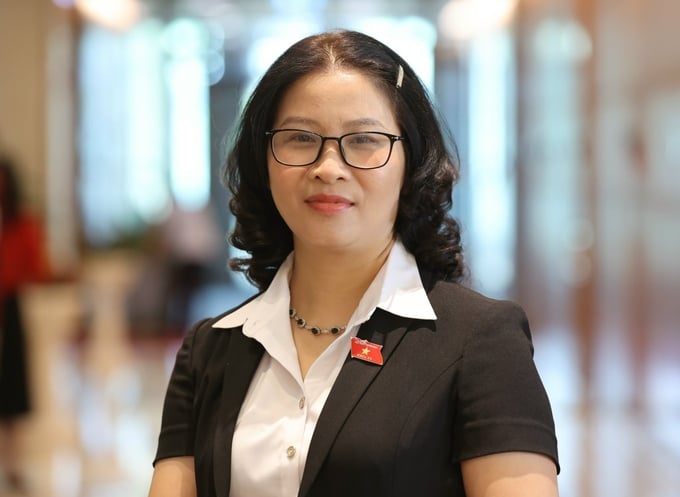
Dr. Nguyen Thi Lan, Director of the Vietnam National University of Agriculture. Photo: HA.
Dr. Nguyen Thi Lan, Director of the Vietnam National University of Agriculture (VNUA) believes that human resources are the “root” to realize the great policy of prosperous agriculture, rich farmers and civilized countryside. However, the high-quality human resources of the agricultural sector are still weak and lacking, especially in terms of experts and leaders, who can master high technology. The untrained rural population still occupies a large proportion of the human resource structure.
Particularly in the period 2016 - 2020, the number of students registered for majors in the fields of agriculture, forestry, water resources and fisheries has decreased by over 30% compared to the period 2011 - 2015. In recent years, some traditional agricultural majors have had few or even no students enrolled.
Dear Dr. Nguyen Thi Lan, as reflected by Vietnam Agriculture News in the series “Find a cure’ for agricultural human resource training”, the current training institutions are full of hardship, so what are the solutions to improve the quality of human resources in the agricultural sector?
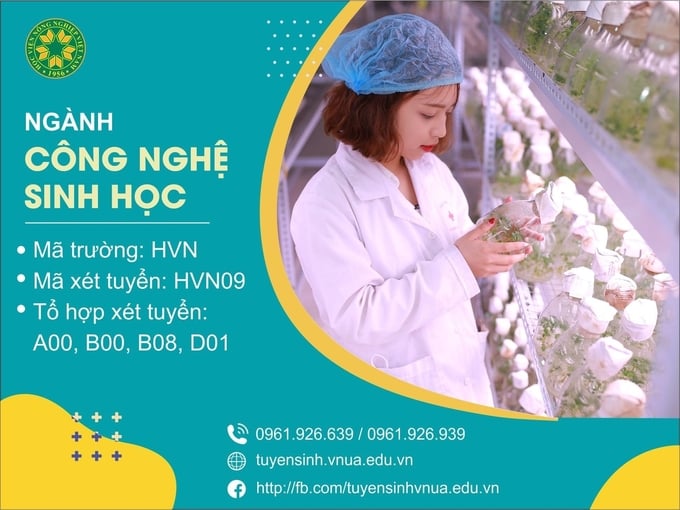
Inspiring and spreading the love for agriculture is a fundamental factor in improving the quality of agricultural human resources. Photo: VNUA.
In order to have high-quality human resources to meet the current requirements, the State, ministries, branches and training institutions need to implement a number of synchronous solutions: Communicate and concretize guidelines and policies of the Party and State, creating unity in the awareness of the whole society from all levels on the importance of agriculture to the country; Provide complete information on human resource demands and areas that the country is in need of; Come up with policies to encourage students to study in social majors that are in high demand but difficult to enroll such as soil science, agronomy, fisheries, and post-harvest technology.
One thing to note is that we need to establish a mechanism for placing orders and assigning tasks to establishments strong in training human resources, especially in important and essential study fields or majors that are difficult to recruit but in high demand.
Along with training high-quality human resources (experts, leaders, engineers, etc.), we should also pay attention to the quality of training, short-term training, skills training, enriching people's knowledge specifically ethnic minorities and people in mountainous areas through specific and highly effective models.
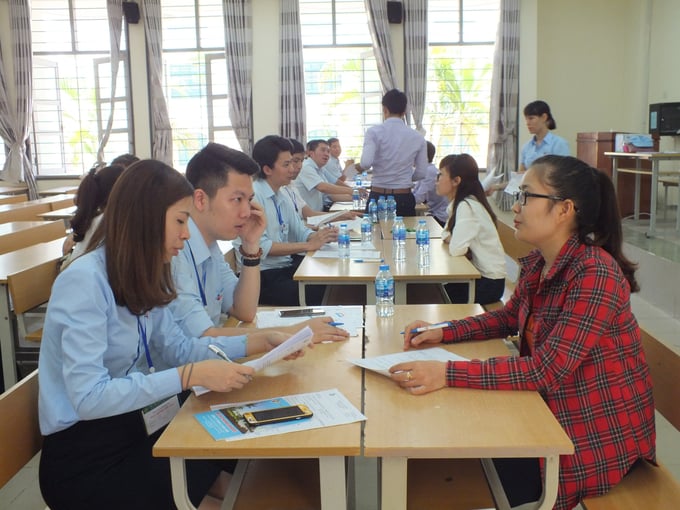
The annual job fair organized by Vietnam National University of Agriculture attracts a large number of businesses in the agricultural sector wishing to recruit quality human resources. Photo: Le Ben.
From your point of view, how has the Vietnam National University of Agriculture implemented these solutions?
VNUA has been renovating the training program, associating theoretical training with practical experience at enterprises in order to respond to changes from reality, quickly bringing new advances in mechanization and automation in agroproduction, opening new professions to strengthen human resources for the agricultural link chain from production and processing to commercialization and business combination.
In order to improve the quality of training, we have implemented a number of key solutions, in which the prerequisite is to raise awareness for staff and students about the agricultural industry, inspire students and help them be more responsible to family, the community and society.
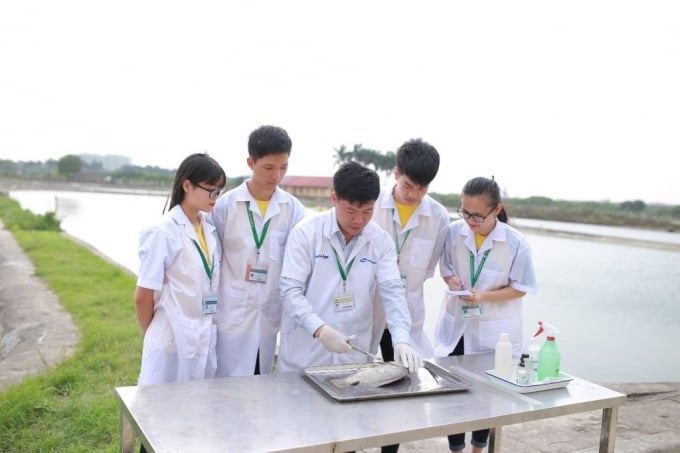
Students of Vietnam National University of Agriculture during practical hours. Photo: HA.
VNUA has a policy to support scholarships, find jobs, strengthen soft skills education, help students orient their work, and cultivate the spirit of entrepreneurship. We teach them how to adapt and overcome challenges. In recent years, the quality of students of VNUA has been highly regarded by society. The rate of graduates having a job after 1 year is consistently high, for example, over 97% in 2022.
Dr. Nguyen Thi Lan, Director of the Vietnam National University of Agriculture
One of the solutions to solve the current difficulties of training institutions is to strengthen international cooperation and association with businesses, how is the execution of Vietnam National University of Agriculture in this regard, madam?
We identify international cooperation as the door to integration. VNUA has cooperative relationships with approximately 200 international partners which are universities, research institutes, development assistance organizations and foreign enterprises.
For many decades VNUA has always been a reliable unit to train high-quality human resources in the fields of agriculture and rural development for Laos, Cambodia, Mozambique, Angolar, and many more, also serving as a qualified training facility to welcome trainees from developed countries such as South Korea, Japan, Australia, USA, and the Netherlands.
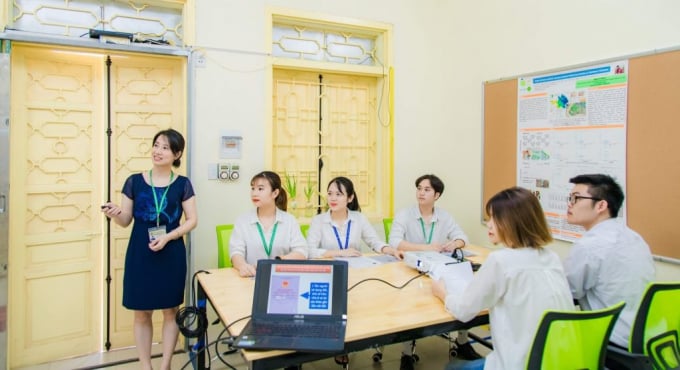
Cooperation and association in training have helped VNUA students solidify important foundations for entrepreneurship. Photo: HA.
Along with training international students, we also promote the development of joint training programs with prestigious universities, helping students access advanced education and agriculture in the world.
The university has recently signed for cooperation with Japanese localities such as Miyazaki, Kagoshima as well as corporations, research organizations and universities in Australia, Denmark, the Netherlands, Israel to send students for internship.
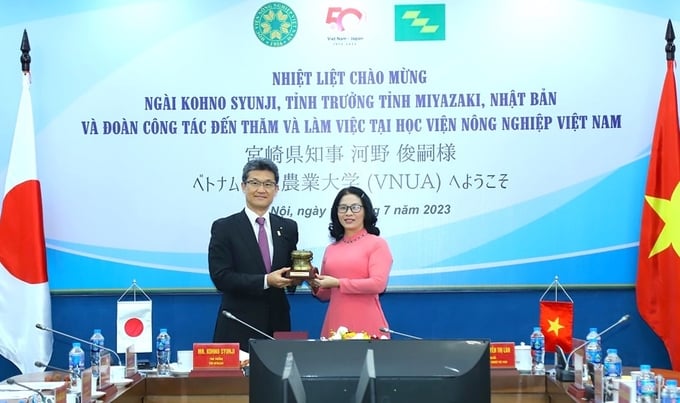
Vietnam National University of Agriculture cooperates extensively and closely with international businesses and organizations to improve education quality. Photo: HA.
VNUA also develops graduate internship programs for final-year students at partner schools in the USA, Canada, the Netherlands, Belgium, etc. This program is organized in the form of two-way cooperation between VNUA and universities or tripartite between VNUA, foreign enterprises and training universities according to the enterprise's order.
The university also actively participates in international conferences, seminars, exchanges of experts and visiting professors. We are deeply aware of the importance of the bond between "learning" and "practice". Every year, we are able to bring nearly 6,000 students to more than 200 enterprises and more than 50 research institutes to practice and improve professional skills.
Thank you, madam!
Translated by Samuel Pham

(VAN) Cold-barn systems efficiently manage environmental and temperature conditions, which aids in the prevention of respiratory diseases in pigs and protects them from the vectors that transmit African swine fevers.

(VAN) To tackle challenges, the project 'Addressing key technical bottlenecks in the grouper supply chain in Vietnam' has been underway since 2024.

(VAN) The project 'Disease-Resilient and Sustainable Cassava Production Systems in the Mekong Region', funded by the Australian Center for International Agricultural Research (ACIAR), is being implemented from 2024 to 2028.

(VAN) Data from 10,000 farming households will help professionalize production organization and support the implementation of the One Million Hectares Program for High-Quality, Low-Emission Rice Cultivation.

(VAN) FAO Director-General QU Dongyu marks International Day of Plant Health at NENA conference.

(VAN) Deputy Minister of Agriculture and Environment Hoang Trung affirmed that floriculture and ornamental plants are a growing industry that receives significant global attention.

(VAN) The three staple crops dominating modern diets – corn, rice and wheat – are familiar to Americans. However, fourth place is held by a dark horse: cassava.